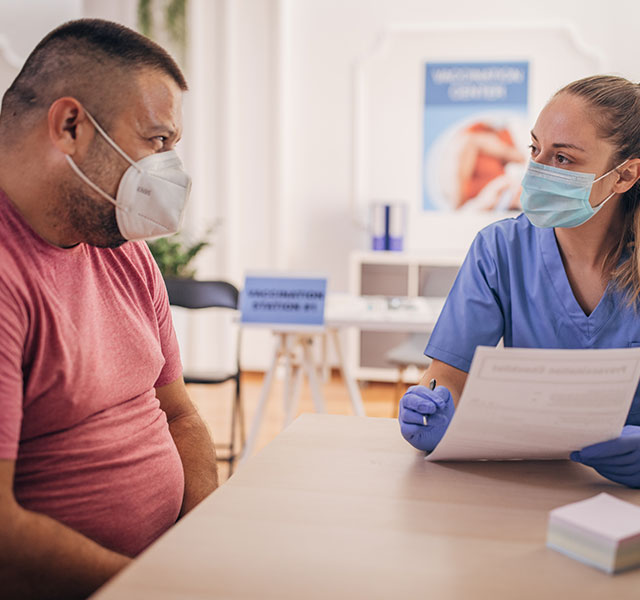Nearly 42% of adults in the U.S. are obese, having a body mass index (BMI) of 25 or greater, according to the Centers for Disease Control and Prevention. Many of these individuals encounter biases because of their size. They may be perceived as lazy or incompetent in various settings, from the classroom to the office and even at home.
Unfortunately, some healthcare providers may also have these misconceptions, which can negatively impact an individual’s health and wellness.
But if you’re overweight, your size and body do not define you, says Allegra Picano, RDN, a registered dietitian at Henry Ford Health. “You can take steps to overcome these biases, advocating for yourself to receive the medical care you need and deserve.”
What Is Weight Bias And Why Does It Occur?
Weight bias is any negative judgment about a person because of their weight. Most often, these misconceptions are directed at individuals who have obesity.
Many people, including some healthcare professionals, assume thin people are more disciplined and successful. They view overweight individuals as lacking self-control and drive.
“For healthcare providers, these misconceptions are driven by a lack of education about obesity, which is a complex condition,” says Picano. While diets high in calories and low in physical activity can contribute to obesity, there are many other underlying causes of the condition, including:
- Biological factors: Genetics and hormone changes that occur with aging can impact weight gain.
- Environmental factors: Individuals who lack access to healthy foods are at an increased risk of obesity. In lower income neighborhoods, people often have more access to convenience foods than healthy options.
- Family or social habits: People’s diets are often influenced by the diets of their families or significant others. For example, if you’re in a relationship, you may prioritize going out to eat with your partner over cooking a healthy meal at home or going to the gym.
- Medications: Some medications, such as steroids or antidepressants, increase the risk of weight gain.
- Other health conditions: Some health conditions, such as hypothyroidism and polycystic ovary syndrome (PCOS) can cause hormonal changes that result in weight gain.
- Mental health issues: For many people, food offers comfort. People experiencing depression or anxiety may turn to food to relieve stress, increasing the risk of overeating.
- Lack of sleep: Many people underestimate the impact of sleep on metabolism and appetite. If you get fewer than 8 hours of sleep at night, you’re at an increased risk for overeating. Poor sleep increases your hunger, causing you to eat extra calories to power through the day.
Medical Professionals And Weight Bias
Obese people can feel intimidated or frustrated when visiting a medical professional with a weight bias. People in these situations often hear negative comments about their weight, such as, “You just need to eat less and exercise more,” or “You’re not trying hard enough,” or “You just need to get control over yourself.”
“Research shows that physicians with a weight bias provide lower quality care to people with obesity,” says Picano. She highlights ways weight bias can negatively impact a person’s healthcare:
- Losing trust in medical professionals: Feeling unheard, someone struggling with weight may be reluctant to follow medical advice or continue treatment.
- Avoiding preventive care: If a person with obesity has a negative care experience, they are less likely to seek regular checkups, immunizations and screenings.
- Returning to unhealthy habits: After a negative interaction, someone with obesity may feel defeated and turn back to overeating or abusing substances or alcohol.
- Declining mental health: Negative feedback can increase risk for depression and anxiety. After hearing negative comments about their size, people with obesity may lose hope about achieving a healthy weight.
Together, these consequences can have a lasting impact on overall health and wellness. People with obesity have an increased risk of developing diabetes, high blood pressure (hypertension) and heart disease — conditions that regular healthcare can avoid or manage.
Strategies For Finding Unbiased Medical Care
The good news is that people with obesity can find high-quality healthcare. “Research shows that physicians who do not have a weight bias can positively impact a patient’s health,” says Picano.
She recommends that people with obesity try these strategies to improve their health:
- Find a doctor who listens to your concerns: Some physicians and healthcare professionals specialize in caring for those struggling with their weight.
- Plan ahead for your medical appointments: Make a list of your symptoms and questions about current medications or treatments you’d like to discuss with your physician.
- Advocate for yourself: Be your own healthcare advocate by speaking up about your needs. Don’t hesitate to ask for more information or additional resources to help you improve your health. Your doctor can refer you to other professionals who can help you manage your weight, offer mental health counseling and increase physical activity.
Weight Bias Resources
Picano recommends these resources to help you address weight bias while also working to improve your overall health and wellness:
- Obesity Action Coalition helps individuals with obesity improve their health through education, advocacy and support.
- The Body Positive offers a variety of education programs, including courses to help individuals develop a healthy relationship with their bodies and take steps to improve their physical and mental health.
- It’s Bigger Than Me offers education to help people better understand obesity as a chronic condition that involves more than weight gain.
Looking for more information about weight loss solutions or want to make an appointment with a physician? Call 1-800-436-7936 or visit henryford.com.
Allegra Picano is a registered dietitian nutritionist for the Henry Ford Center for Health Promotion and Disease Prevention.



